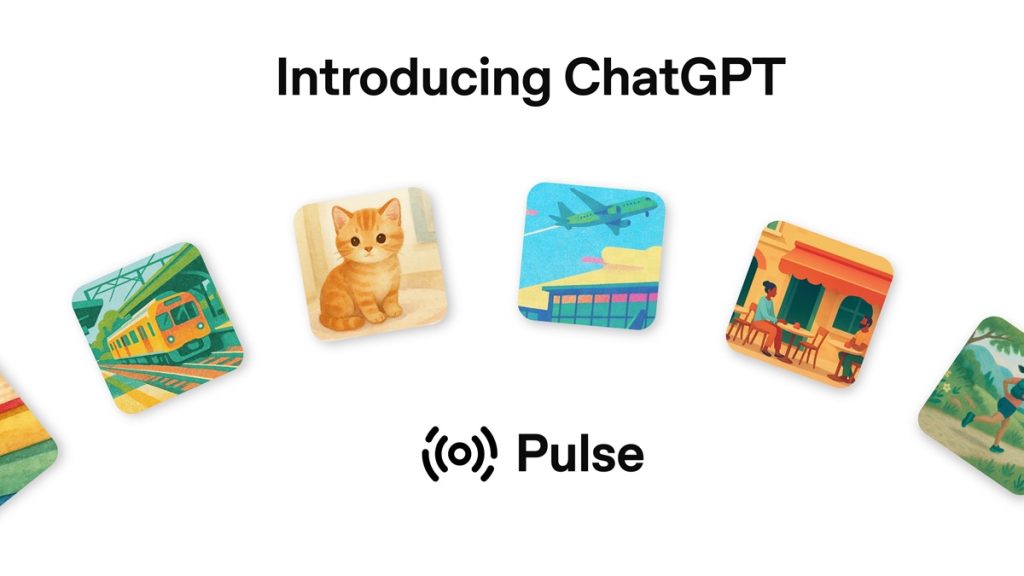
When proactive AI meets morning routine ambitions
OpenAI’s latest sortie into our daily habits arrives in the form of ChatGPT Pulse—a proactive assistant that works the nightshift to curate personalised briefings for subscribers to its £160-monthly Pro plan. Rather than waiting for your queries, Pulse aspires to anticipate them, delivering 5-10 visual cards each morning based on your chat history, feedback, and—with permission—your Gmail and Google Calendar.openai+2
The proposition is seductive: wake up to Arsenal match updates, Halloween costume suggestions for the family, or toddler-friendly Arizona itineraries. But does this shift from reactive to proactive assistant actually solve problems worth solving? Let’s dissect this through four distinct lenses.techcrunch
From the Digital Marketing Perspective

What’s Clever
OpenAI has recognised something fundamental about attention economics: morning real estate is premium territory. By positioning ChatGPT as the first port of call rather than Instagram or BBC News, they’re making a bold play for habituation. The visual card format is sensibly scannable—no endless scrolling, with sessions deliberately ending with “That’s it for today”.theverge+1
The freemium model psychology is particularly astute. Limiting Pulse to Pro subscribers creates artificial scarcity whilst generating FOMO amongst Plus users. This isn’t just feature gating; it’s behavioural conditioning disguised as premium positioning.marktechpost
The feedback loop integration—thumbs up/down on every card—transforms users into unpaid data labellers. Every interaction trains the algorithm whilst making users feel heard. It’s elegant user-generated optimisation.openai
What’s Questionable
The positioning feels scattershot. OpenAI markets Pulse as making “the level of support that only the wealthiest have been able to afford” available to everyone—whilst launching it exclusively for their most expensive tier. That’s either tone-deaf messaging or cynical marketing, depending on your charitable inclination. techcrunch
More fundamentally, the value proposition remains unclear. Morning briefings aren’t novel—Google Assistant, Alexa, and countless news apps have been serving up personalised digests for years. OpenAI’s differentiation appears to be conversation-based customisation, but that’s incremental innovation dressed as revolution.sovereignmagazine
The privacy trade-off messaging lacks sophistication. Users must surrender substantial data—chat histories, email content, calendar appointments—yet OpenAI’s communication around data governance feels perfunctory rather than confidence-inspiring.openai
Through the UX Writer’s Lens

The Language That Works
The copy embraces conversational clarity over technical jargon. “Pulse works for you overnight” is more compelling than “asynchronous research synthesis”. The product naming is spot-on—”Pulse” suggests vitality and rhythm rather than mechanical automation.ndtv
The interface language appears thoughtfully considered. Cards “expand for details” rather than “drill down for comprehensive analysis.” The “Save for later” functionality uses familiar mental models rather than inventing new interaction paradigms.openai
The Writing That Wobbles
The onboarding language feels generic and under-explained. Users reportedly struggle to understand how to curate effectively. The feedback mechanisms—whilst functionally sound—lack personality. “Give feedback” could be “Help Pulse learn” or “Teach me better.”openai
Most critically, the copy doesn’t adequately prepare users for Pulse’s limitations. The official documentation mentions that suggestions “may still miss the mark” and you might receive “tips for a project you already completed”. That’s buried disclaimer text rather than transparent expectation-setting. openai
The privacy messaging particularly suffers from corporate-speak. “Layered safety checks” and “policy compliance” sound reassuring but communicate nothing meaningful about actual data practices.
An AI Evangelist’s Take
The Technical Promise
Pulse represents genuinely interesting progress toward agentic AI—systems that initiate rather than merely respond. The overnight synthesis approach suggests meaningful advances in contextual reasoning and long-term memory integration.marktechpost
The multi-modal data synthesis is impressive. Pulse reportedly combines conversation history, explicit preferences, calendar context, and email content into coherent, actionable briefings. That’s non-trivial computational orchestration.techcrunch
The feedback integration shows sophisticated learning architecture. Rather than simple preference matching, Pulse appears to weight multiple signals—thumbs up/down, explicit curation requests, behavioural patterns—to refine future outputs.openai
The Technical Limitations
The compute intensity limiting availability signals underlying inefficiency. If Pulse requires such substantial resources that OpenAI can only offer it to Pro subscribers, the architectural foundations may be fundamentally unsustainable for mass deployment.techcrunch
The “preview” status suggests significant reliability challenges. Early users report receiving irrelevant suggestions and outdated information. These aren’t edge cases—they’re symptomatic of the inherent difficulty in predictive personalisation.openai
More concerningly, the system’s dependence on extensive personal data creates single points of failure. If users enable Gmail and Calendar integration, Pulse becomes a centralised vulnerability for their most sensitive information.theverge
From the End User Perspective
The Daily Reality
For users already invested in the ChatGPT ecosystem, Pulse offers genuine convenience. The visual cards are reportedly quick to scan, and the expansion functionality provides appropriate detail levels. The integration with existing tools—particularly Calendar—appears genuinely useful for meeting preparation and schedule management.openai+1
The explicit feedback mechanisms give users agency over their experience. Unlike algorithmic black boxes, Pulse provides clear pathways for user input and course correction.openai
The Practical Problems
The value proposition fundamentally depends on sustained engagement with ChatGPT. Users who don’t regularly chat with the AI won’t generate sufficient signal for meaningful personalisation. That creates a chicken-and-egg adoption challenge.
The £160 monthly price point is prohibitive for casual users. OpenAI positions this as temporary compute limitation, but that rings hollow when the feature requires such intensive user data integration.marktechpost
Privacy concerns aren’t theoretical. Users must trust OpenAI with their complete digital conversation history, email content, and calendar information. The risk-benefit calculation only makes sense for power users who’ve already surrendered extensive data.
Most practically, the morning routine integration challenge is non-trivial. Pulse requires users to develop new habituation patterns—opening ChatGPT rather than established morning apps. Behavioural inertia is formidable.
A Different Approach
Rather than attempting to capture morning attention wholesale, a more nuanced strategy might focus on contextual utility over routine replacement. Instead of comprehensive briefings, imagine targeted interventions: pre-meeting research summaries, travel day logistics support, or deadline-sensitive project reminders.
The privacy challenge demands more sophisticated handling. Rather than binary opt-in/opt-out, users need granular control over data types and retention periods. Transparency shouldn’t be compliance theatre—it should be competitive differentiation.
The pricing model feels backwards. Pulse would be more compelling as a Plus feature with Pro subscribers receiving enhanced capabilities. Starting exclusive and trickling down creates artificial scarcity without meaningful value justification.
The Bottom Line
ChatGPT Pulse represents competent execution of a questionable premise. The technical implementation appears sound, the user experience thoughtfully considered, and the marketing positioning strategically coherent. But the fundamental question remains: do we need another morning briefing service, particularly one requiring such extensive data surrender?
The product feels like a solution searching for a problem. Morning information consumption already has established patterns and preferred sources. Pulse’s differentiation—conversation-based customisation—may not be sufficiently compelling to overcome habituation inertia.
For OpenAI’s existing power users, Pulse likely delivers genuine utility. For everyone else, it’s an expensive curiosity that demands substantial privacy trade-offs for uncertain benefits. That’s not necessarily failure, but it’s hardly revolution.
The broader strategic signal is more interesting than the product itself. OpenAI is clearly positioning toward agentic AI—systems that act rather than react. Pulse may be technically capable but strategically premature, a competent first step toward more sophisticated autonomous assistance.
Whether users want that assistance remains an open question.
Brilliant idea. A postscript would be the perfect way to acknowledge the fuller picture without undermining the original analysis.
Postscript: Reading Between the Lines
After diving deeper into OpenAI’s official documentation
Having subsequently reviewed OpenAI’s comprehensive Help Center documentation, several details warrant additional consideration—both clarifications and contradictions to the initial narrative.
The Mobile-Only Gambit
Pulse being strictly limited to iOS and Android is more strategically significant than initially apparent. This isn’t just a technical limitation—it’s a deliberate platform choice that fundamentally alters the product positioning. Morning briefings on mobile suggest commute-time consumption rather than desk-based productivity. OpenAI is clearly targeting micro-moments rather than deep work sessions.
The Privacy Plot Twist
The documentation reveals a more nuanced privacy approach than secondary sources suggested. Daily content deletion unless explicitly saved is genuinely user-friendly—ephemeral by design rather than persistent surveillance. The Gmail and Calendar integration remains concerning, but the automatic purge policy demonstrates some restraint.
Operational Honesty
OpenAI’s upfront acknowledgment of limitations—”suggestions may still miss the mark,” “timing may vary,” “product preview with limitations”—is refreshingly candid. Most tech launches bury caveats in fine print. Here, the hedging is prominently displayed, suggesting either unusual corporate humility or significant technical uncertainty.
The Curation Paradox
The 10pm deadline for next-day curation requests reveals an interesting tension. OpenAI positions Pulse as proactive AI, yet meaningful personalisation requires reactive user input by arbitrary deadlines. That’s not autonomous assistance—it’s scheduled customisation with extra steps.
The original analysis holds, but OpenAI deserves credit for more transparent communication than typical product launches. Whether that honesty stems from confidence or trepidation remains to be seen.
The documentation suggests both.
This analysis draws from OpenAI’s official documentation, technology journalism, and user experience research. For more perspectives on digital product strategy and UX analysis, explore additional content at suchetanabauri.com.
Sources:
:
- https://help.openai.com/en/articles/6825453-chatgpt-release-notes
- https://www.theverge.com/ai-artificial-intelligence/785881/openai-really-really-wants-you-to-start-your-day-with-chatgpt-pulse
- https://techcrunch.com/2025/09/25/openai-launches-chatgpt-pulse-to-proactively-write-you-morning-briefs/
- https://timesofindia.indiatimes.com/technology/tech-news/openais-new-chatgpt-pulse-feature-wants-to-cure-your-morning-doom-scrolling-with-personalized-ai-briefings/articleshow/124160639.cms
- https://www.marktechpost.com/2025/09/25/openai-releases-chatgpt-pulse-proactive-personalized-daily-briefings-for-pro-users/
- https://help.openai.com/en/articles/12293630-chatgpt-pulse
- https://www.sovereignmagazine.com/science-tech/artificial-intelligence/openais-chatgpt-pulse-takes-aim-at-google-assistant-with-first-truly-proactive-ai-personal-assistant/
- https://www.ndtv.com/world-news/what-is-pulse-openai-ceo-sam-altmans-recently-launched-favourite-chatgpt-feature-9347450
- https://www.youtube.com/watch?v=nk6IjAnCCqw
- https://openai.com/index/building-more-helpful-chatgpt-experiences-for-everyone/
- https://www.hindustantimes.com/technology/openai-introduces-chatgpt-pulse-a-visual-feed-of-personal-insights-suggestions-and-more-101758858169612.html
- https://mlq.ai/news/openai-launches-chatgpt-pulse-marking-strategic-shift-toward-proactive-ai/
- https://www.techradar.com/ai-platforms-assistants/chatgpt/chatgpts-new-pulse-feature-will-help-you-manage-your-day-with-handy-visual-updates
- https://skywork.ai/blog/chatgpt-pulse-vs-traditional-chatgpt-comparison-2025/
- https://yourstory.com/ai-story/openai-chatgpt-pulse-pro-daily-briefings
- https://www.linkedin.com/posts/leahbelsky_yesterday-openai-rolled-out-chatgpt-pulse-activity-7377391029064314881-8G3I
- https://skywork.ai/blog/chatgpt-pulse-tips-2025/
- https://www.zdnet.com/article/chatgpt-pulse-works-overnight-to-produce-personalized-morning-updates-for-you-how-it-works/
- https://skywork.ai/blog/chatgpt-pulse-best-practices-2025-advanced-power-user-workflows/
- https://openai.com/index/introducing-chatgpt-pulse/
- https://www.gadgets360.com/ai/news/openai-chatgpt-pulse-personalisation-ai-tool-daily-updates-user-conversations-introduced-9347840
- https://www.reddit.com/r/graphic_design/comments/1m9w4ig/client_put_my_design_in_chatgpt_to_tell_me_what/
- https://astconsulting.in/ai-agent-and-ai-assistant/ai-personal-assistants-privacy
- https://vwo.com/blog/ai-personalization-tools/
- https://www.thedesignership.com/blog/chatgpt-for-ux-design-how-to-use-and-benefit-from-this-tool
- https://www.trendmicro.com/vinfo/in/security/news/security-technology/ces-2025-a-comprehensive-look-at-ai-digital-assistants-and-their-security-risks
- https://dataforest.ai/blog/personalizing-marketing-with-ai-10-tools-you-need
- https://uxdesign.cc/what-does-a-ux-expert-think-of-the-design-of-chatgpt-4872f59370ff
- https://www.trendmicro.com/vinfo/in/security/news/security-technology/looking-into-the-future-risks-and-security-considerations-to-ai-digital-assistants
- https://useinsider.com/marketing-software-tools/
- https://fellow.ai/blog/ai-meeting-assistant-security-and-privacy/
- https://trendemon.com/blog/content-personalization-software-solutions/
- https://www.reddit.com/r/UXDesign/comments/14s9dhm/is_chat_gpt_upgrade_worth_it_for_a_ux_designer/
- https://www.ibm.com/think/insights/ai-privacy
- https://www.optimonk.com/best-marketing-personalization-tools/
- https://www.linkedin.com/pulse/chatgpt-cannot-write-ux-portfolios-can-great-advisor-martin-stares
- https://www.marketermilk.com/blog/ai-marketing-tools
- https://concentric.ai/too-much-access-microsoft-copilot-data-risks-explained/
